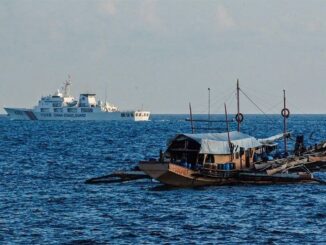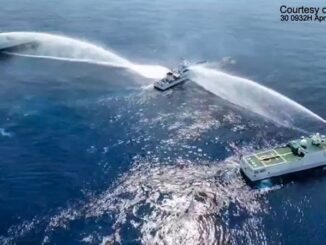
Philippine Ambassador to the United States Jose Manuel “Babes” Romualdez on Friday said the cooperation of America in terms of maintaining stability in the Indo-Pacific region would not change under the fresh term of President-elect Donald Trump.
Romualdez made the remark in a virtual forum hosted by the Foreign Correspondents Association of the Philippines (FOCAP), noting that it was in the interest of the US to block China’s domination over the South China Sea (SCS).
“It is in their interest that the Indo-Pacific Region remain free and clear… It is important that this area remains free and clear from any dominant country or that is trying to dominate it by claiming the 10-dash line, that it’s their territory,” Romualdez said.
“When you have that, you could be sure that the United States is not going to back out of that type of situation where we have like-minded countries thinking the same way. And so, I don’t see any real change on that even if whatever happens,” he added.
Romualdez also stated this similar view with regard to the US’ defense cooperation with the Philippines, which is among the claimant countries that assert its sovereignty on the West Philippine Sea, which is part of the South China Sea.
“It was the administration of Trump that actually put forward the ironclad commitment and as I said, this commitment is based on the fact that it is mutually beneficial to both our countries,” Romualdez said.
“With us, it is important that the presence of the United States as an ally in our region and not only us, including some of our ASEAN (Association of Southeast Asian Nations) neighbors who welcome the presence of the United States to balance off China’s behavior especially at this time,” he noted.
For the US, Romualdez said it is likewise in their interest “because trillions of dollars pass through that lane.”
“So again, it goes back to the economy of all the countries that get involved. If we allow one country to dominate and control that area, then we are in for a really big global economic dislocation to say the least because of the control that will be placed that one country is trying to do, claiming that they own the entire area,” he said.
Tensions continue as Beijing claims almost all of the South China Sea— a conduit for more than $3 trillion of annual shipborne commerce, including parts claimed by the Philippines, Vietnam, Indonesia, Malaysia, and Brunei.
In 2016, an international arbitration tribunal in Hague ruled in favor of the Philippines over China’s claims in the South China Sea, saying that it had “no legal basis.”
China has rejected the decision.
Shortly after US media outfits declared Trump as the winner of presidential polls on Wednesday, President Ferdinand “Bongbong” Marcos Jr. congratulated Trump on his “victory” and expressed hope that the US and Philippines’ “unshakeable alliance, tested in war and peace, will be a force of good that will blaze a path of prosperity and amity, in the region, and in both sides of the Pacific.”
During the Biden administration, the US expressed support to the Philippines in the WPS issue.
The Armed Forces of the Philippines (AFP) likewise expressed optimism that the US would maintain its support with regard to West Philippine Sea (WPS) issues.
“Our military relationship will remain strong. It is both in our interests that the Indo-Pacific will remain free and open to all,” Philippine Navy spokesperson for WPS Rear Admiral Roy Vincent Trinidad told reporters. — VDV, GMA Integrated News





Be the first to comment